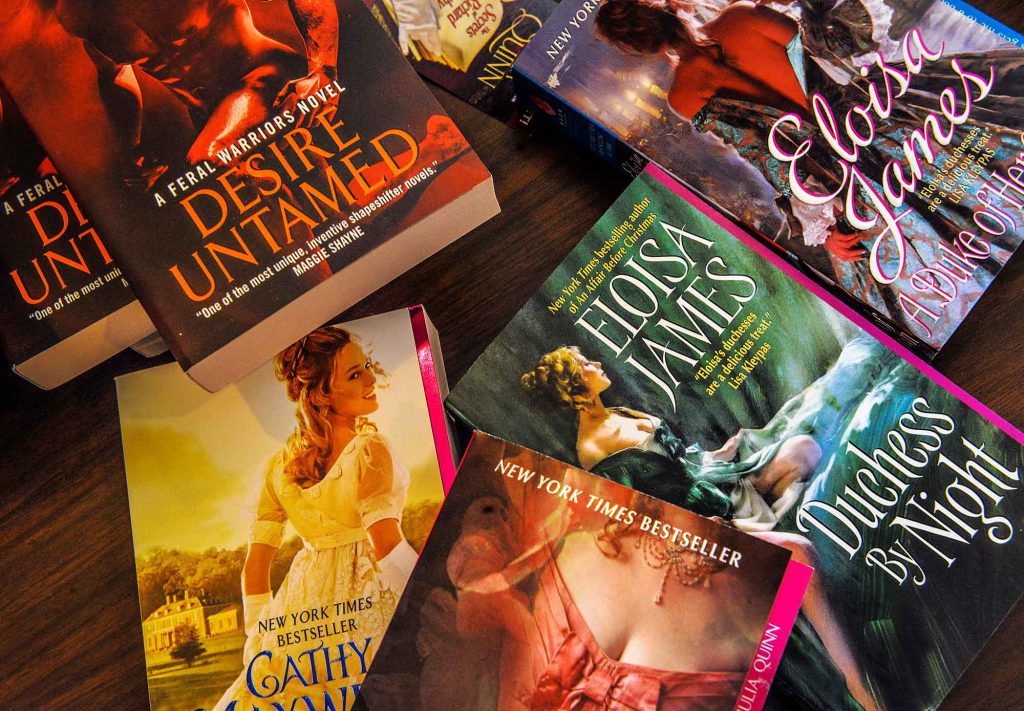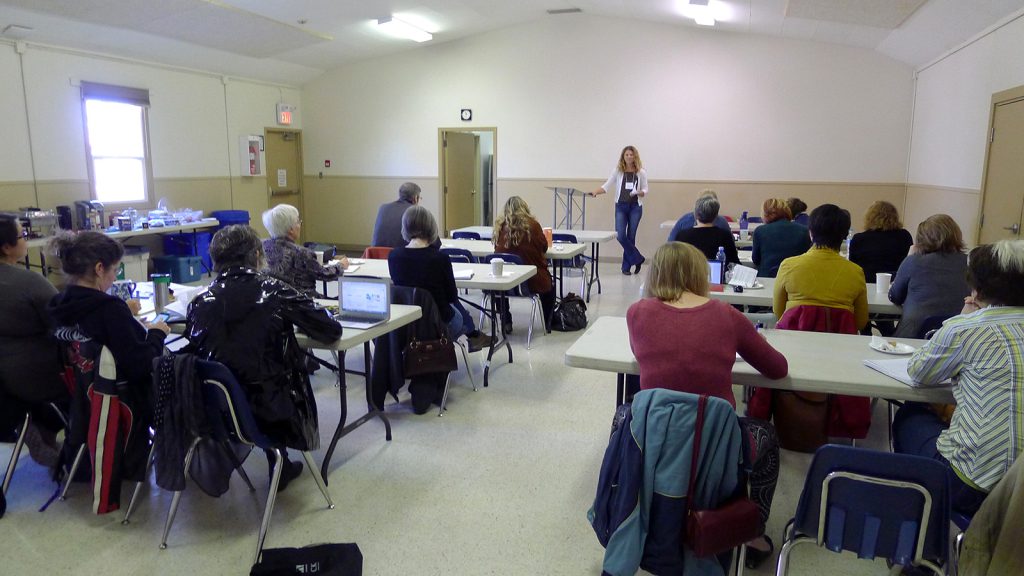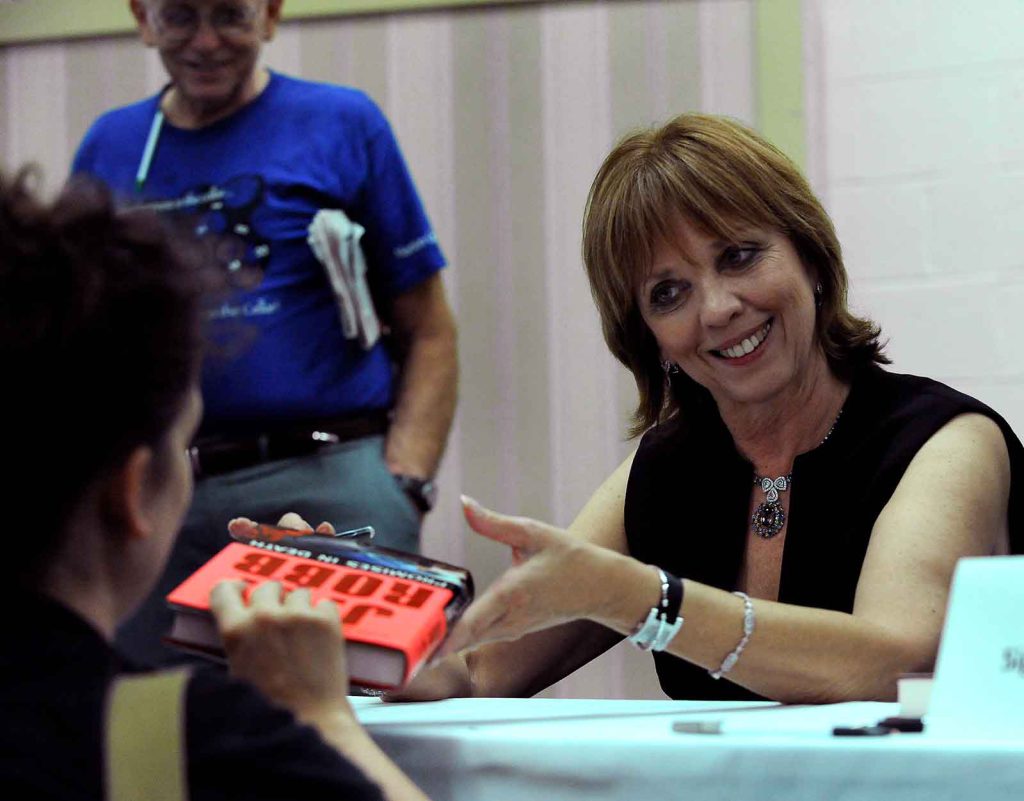An Author by Any Other Name

Sitting in a packed hotel lobby café in Washington, D.C., in 2009, I leaned closer to the literary agent I was interviewing for my research on romance writers. She’d brought along one of her authors, since they were meeting for lunch afterward, and I’d asked them about pen names. “I’ve gotten to the point,” the agent said, “where, with a lot of my clients, I just start by habit calling them by their pen names.” The author chimed in, laughing, “Oh, I signed my gas bill with my pseudonym.”
Fun fact: Georgia Democratic gubernatorial candidate Stacey Abrams, who nearly toppled Republican Brian Kemp last fall, writes romance novels under the name Selena Montgomery.
Names are an essential part of our everyday lives. But for romance writers, they are something more: tools for career success. Writers create new names with the aim of using them to manage and increase their readership. They use them to preserve anonymity, to separate their work in different genres, and to create a brand.
English professor Mary Bly, for instance, publishes her historical romances under the pen name Eloisa James, using the name to create some distance between her academic and fiction-writing selves. After she received tenure, the “secret” identity became a public one, though she still uses both names. Jayne Ann Krentz, a romance author with a long career, started off using her birth name, Jayne Castle, but as she began publishing with other publishers and in other subgenres, she picked up more names. She currently uses Amanda Quick for her historical romances, Jayne Ann Krentz (her married name) for her contemporary romances, and Jayne Castle for her futuristic romances.
From 2008 to 2010, I dove into the world of Canadian and American romance writing. At least half of the dozens of authors I met used a pen name; many had two or three. As a linguistic anthropologist, I was fascinated by what these pen names said about the power of words. What was the connection between something as personal as a name and the market forces romance writers were concerned about? How were these names created and used?
North American romance writers’ main professional association, the Romance Writers of America (RWA), has chapters all over the United States and Canada. These chapter meetings, and the yearly national and regional conferences, are where aspiring and published writers learn the meaning of pen names, the techniques behind character-driven plotting, and how to write scintillating dialogue. They were also a great place for me as an anthropologist to meet writers and to see how they talked about the work of writing among themselves.
In 2008, I sat in a community room in a public library in a large Canadian city, listening to two members of the local RWA chapter present on marketing. Two blond, white women in their late 30s, they ran an engaging workshop, keeping the 40 or so published and aspiring writers (most of whom were also women) involved with activities like perfecting elevator pitches and developing slogans. It became clear to me that being a romance writer is not only about the writing. It’s also about convincing a whole slew of people—agents, editors, publishers, readers—that they should read (and buy) your book.
“I resolve to make my writing stand out from the crowd” was near the top of their list of “marketing resolutions.” Pen names, they said, are one way of standing out. Like a brand in the business world, a good pen name sets the stage for a relationship with the reader. A good name, writers believe, could give you a start in the market—or a restart, if you experienced only mediocre sales with your previous book. Even publishers with their own strongly recognizable name, like Harlequin, frequently ask authors to take a pen name to strengthen their own particular branding. A pen name is seen as a way to help authors take control of their career and steer it to a higher level.
During my time researching this community, advice circulated on the kind of pen name that would bring success. The name should be short so it can be large on the book cover, people advised, and it should be easy to spell. It should be near the beginning of the alphabet so your books don’t end up near the floor on bookstore shelves. And you should think about which authors would be placed next to your book in an alphabetically arranged order; it might be good for the fan of one author to stumble upon your similarly styled books, for example.
A name is not just a series of letters—it has a social and cultural meaning.
Research has shown that names do make a difference. University of Sheffield economist Georgios Efthyvoulou, for instance, has found that in the field of economics, people with a last name earlier in the alphabet (those who appear near the beginning of an alphabetically ordered list in multi-authored papers) are more likely to be employed at an elite research university. Numerous studies of résumé submissions in North America have shown that people from racial minority groups receive more job interviews if they “whiten” their names in their applications. A name is not just a series of letters—it has a social and cultural meaning thanks to our expectations of what types of people line up with certain kinds of names.
Anglophone names that are fairly short, like Wiggs and Roberts, seem to be popular for romance authors. In the United States, most romance readers are female (82 percent) and white (73 percent); when I did my research, the industry perception was that, except for the readers of explicitly African-American romance lines, readers expected their writers to be likewise. French last names, such as that of romance author Jude Deveraux, used to be more popular, but during my research, French-Canadian authors were advised to Anglicize their pen names.
Western literature has a long history of pen names. Women authors have often published under a man’s name in order to hide their gender. Nineteenth-century author Charlotte Brontë, for instance, wrote under the name Currer Bell, while her sisters Emily and Anne published as Ellis and Acton. That hasn’t entirely changed. Women who write in more male-dominated genres today still sometimes change their authorial names: Nora Roberts, for example, a renowned author of more than 200 romance novels, writes as the more gender-neutral J.D. Robb for her thrillers.
Most authors today don’t expect their alter egos to be secret. Some, for example, have a website for each pen name, but all of the sites are linked to each other as known pseudonyms. In most cases, complete concealment is not the point. Instead, the aim is to create separate brands that shape reader expectations, just as a company like Gap Inc. creates different retail experiences with Gap, Old Navy, and Banana Republic, among others.
Up until the late 20th century, publishers often controlled romance writers’ pen names; many writers had contracts that stated they couldn’t use a name (especially a pen name) that they’d used with one publisher in order to publish a book with another. By 2008, however, when I started my research, authors mostly controlled their own names. They built their websites, chose their names, and were the center of their own careers.
Whether or not a new name really can help to create a successful career, romance writers continue to take on pen names, even as the publishing market shifts toward the eventual obsolescence of physical bookshelves. And the authors don’t seem to mind; indeed, they embrace their new names so completely that they forget which one they should use to sign their checks. In the meetings I attended, authors referred to each other in conversation by combinations of pen and original names. Some even signed my interview consent forms with their pen names.
Very few people I met insisted on publishing under their “real” name, nor were they insulted by publishers’ requests to change their name or adopt a new one. Most thought the process of choosing a pen name was fun; many explicitly said that it would be “cool.” When some heterosexual women marry, they often take on a new last name; why not take on another name to become an author? At a reception in a hotel bar after a chapter meeting, gin and tonic in hand, I met a soon-to-be-published author whose publisher had told her that her last name was hard to spell and not “romantic” enough. She agreed to change it, and off she went to enlist the help of her critique group and agent to choose a new one. To me, her original last name didn’t seem unromantic, but then again, I’m only an anthropologist.

































